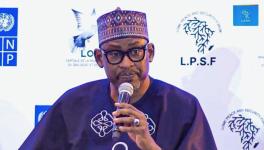US Sanctions on Iran Amidst Corona Pandemic
In the middle of the Covid-19 epidemic, on 17 March, the United States Secretary of State Mike Pompeo announced fresh sanctions against Iran. He announced that nine entities based in China, Hong Kong , South Africa, as well as three Iranian individuals, would be blacklisted by the United States Department of State for trading in Iranian petrochemicals. It should be noted that these steps have been taken not only in the middle of a pandemic, but also at a juncture where universal solidarity has been expressed cutting across boundaries to fight the Novel Coronavirus scourge.
But for Uncle Sam, it’s business as usual, that too against a country which has witnessed one of the most severe outbreaks of the virus with nearly 32,332 infected and 2,370 dead.
Sanctions against Iran are of different types. There are United Nations sanctions, multilateral sanctions imposed by several countries, and unilateral sanctions imposed by a single nation. It is the United States which has been most proactive in the imposition of unilateral sanctions. The impact of these sanctions on the Iranian ability to acquire medical products are multifold.
First, it severely limits the economic potential of the nation, especially its ability to export oil and other related products. Therefore, the ability to acquire medicines and other hospital equipment is significantly curtailed. Second, the sanctions have created panic among enterprises or countries to deal with Iran, even if there are avenues to do so. For instance, humanitarian exceptions have been a norm in all sanctions, including the United States and UN sanctions.
Humanitarian exceptions include the importing of medicines and other medical equipment. However, since there is a constant fear of blacklisting, few attempt to choose this avenue. Third, through construction of complicated webs within the sanctions, the ability of the Iranian state to explore humanitarian exceptions are significantly weakened. For instance, last year, alleging Iranian role in bombing of Saudi oil refineries, the US treasury “under its counterterrorism authority” imposed further sanctions on the Central Bank of Iran (CBI).
This excluded the role of CBI from any humanitarian aid. Considering the pivotal role played by the CBI in foreign exchange transactions which are essential to import medicines, the net impact of this policy was further hardships for Iranian people.
Similar to his several predecessors, Donald Trump claims that unless Iran completely stops any attempts to build a nuclear bomb, such sanctions would continue. However, Obama administration’s deal with Iran in 2015, despite all its limitations, was precisely a step towards that direction.
It should be understood that the nuclear weapon boggy used at Iran, whenever suitable, is a distinctly hypocritical one. First, Iran is a signatory of the Nuclear Non-Proliferation Treaty (NPT). Second, the entire premise of the 2015 deal was also based on Iranian promise to not launch such programs. Further, if nuclear proliferation is the concern, Israel, which is the only nation in the Middle East which has an active nuclear program who is also a non-signatory of the NPT, should have been at the receiving end of innumerable sanctions.
But not only is it not a signatory, it is also an active collaborator of the United States in the entire region. It thus becomes clear that nuclear proliferation is a flimsy excuse given by the United States to achieve its geopolitical targets.
The aim of sanctions, as pointed out by Pompeo and broadcast on CBS News on 14 February 2019 is, “Things are much worse for the Iranian people [with the US sanctions], and we are convinced that will lead the Iranian people to rise up and change the behaviour of the regime”. Regime change, as it was the case with sanctions in Iraq, is the objective. Invention of rhetoric, whether it be nuclear bomb or abetting terrorism, is a part and parcel of the strategy.
Overall, even before the advent of the Coronavirus pandemic, the sanctions had created severe distress for Iranian health officials in dealing with several diseases. There has been reported scarcity of medicines, especially for those suffering from haemophilia, multiple sclerosis and cancer. The ongoing pandemic has taken the impact of sanctions to yet another level. Even key supplies, including infusion pumps, are scarce in Iran.
Like a cruel joke, amidst the sanctions and ensuing crisis in Iran, the United States offered help. Like any other self-respecting nation, Iran declined the offer. As an interim relief measure, the least the USA can do is to temporarily lift the sanctions. There are precedents for this in the recent years, for instance, in 2004 as well as 2012, sanctions were temporarily suspended due to earthquakes in Iran. However, there has been absolutely no indication of such steps by the Trump administration.
The actions of the United States, although monumentally cruel, should not be surprising. If the recent proclamations of Donald Trump are of any indication, he wants to revoke lockdown in the USA, and have the economy running as normal, risking lives of thousands. The Coronavirus bill, put forward in the United States Congress offers pittance to the poor and deprived, as interim relief. The point to be noted is that the US state, at the current juncture, is not the least bit concerned about the weaker sections of their own society.
To expect them to be concerned about Iran and its problems, is expecting a miracle. Let us hope against hope that when the history of this episode is written, Iran would not be portrayed as the villain and the USA, as the noble saviour.
The author is a senior researcher at the Centre for Equity Studies, New Delhi.
Get the latest reports & analysis with people's perspective on Protests, movements & deep analytical videos, discussions of the current affairs in your Telegram app. Subscribe to NewsClick's Telegram channel & get Real-Time updates on stories, as they get published on our website.























